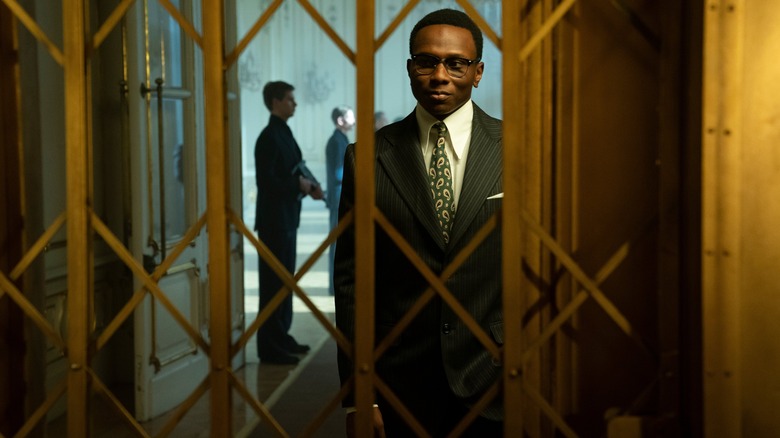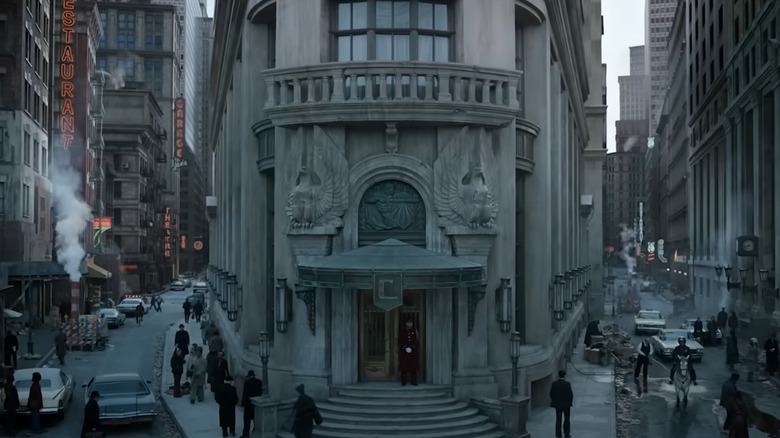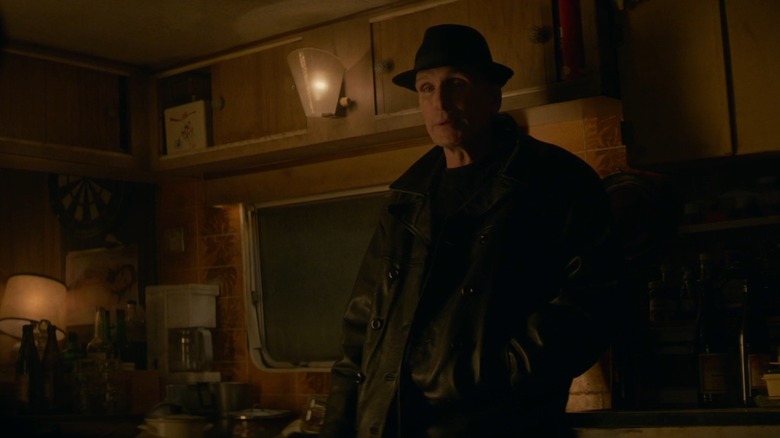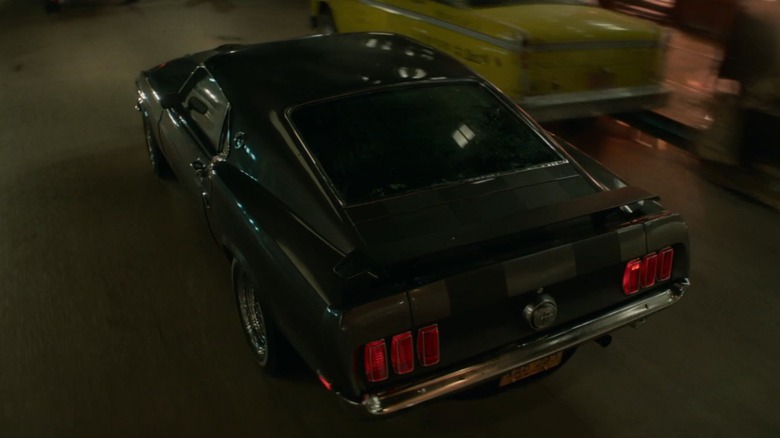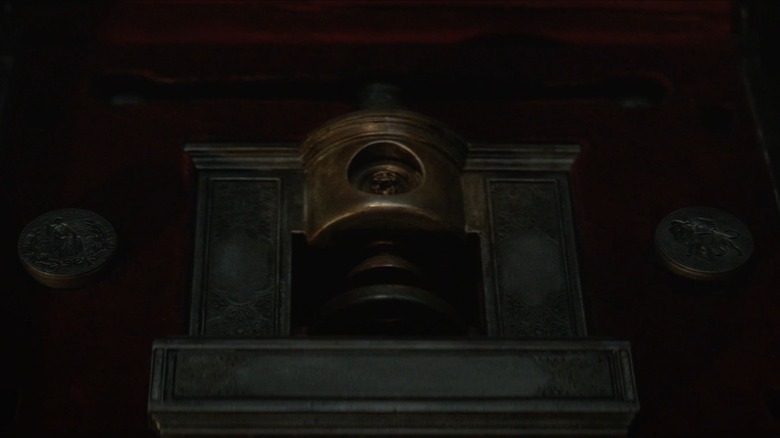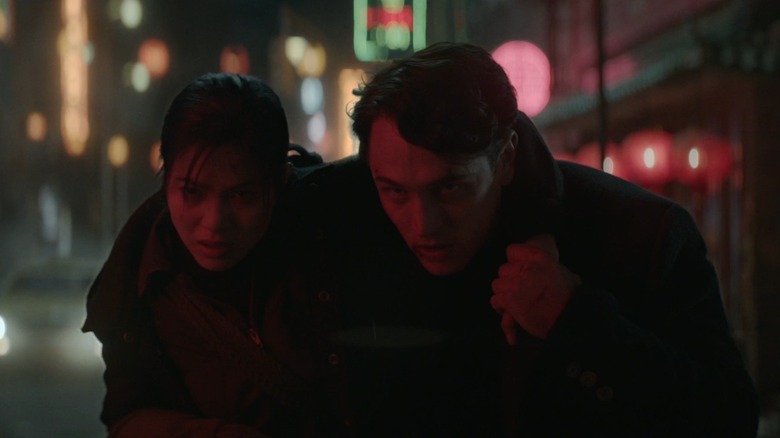The Continental: All The Best John Wick Easter Eggs And References
Warning: This article contains spoilers for the premiere episode of "The Continental."
Almost 10 years after the original "John Wick" came out of nowhere and blew the minds of action aficionados everywhere, we're now getting our most expansive addition to the franchise yet. The story of Keanu Reeves' gun-slinging assassin with a love of dogs has been told to completion on the big screen (or it seems to have been, at least), so where else can the franchise go?
The answer, for better or worse, comes in the form of the streaming series "The Continental," which yours truly reviewed for /Film here. Set predominantly in 1970s New York City and following the exploits of young Winston Scott (with Colin Woodell taking over for Ian McShane, who portrayed the same character in the movies), the series attempts to split the difference between telling a brand-new story with a whole new cast of characters and packing in all sorts of overt winks and nods to the movies everyone loves.
How well the show's creative team pulled this off remains in the eye of the beholder, of course, but fans will undoubtedly get a thrill out of seeing just how much homage "The Continental" pays to its cinematic predecessors. Casual viewers may not even notice certain Easter eggs or cameos that are snuck into the action in the early going, but "Wick" experts will have plenty of opportunities to channel their inner Leonardo DiCaprio pointing meme. With the first of three feature-length episodes now available to stream on Peacock, we'll focus on breaking down all the best "John Wick" references included in the premiere of "The Continental."
A very different Continental
Same stomping grounds, same house rules ... but that's pretty much where the similarities end between the Continental featured in the "John Wick" movies and the one we spend so much time in and around throughout "The Continental." The hotel itself isn't much of an Easter egg, per se, but observant fans should take note of just how different the establishment set within the city's iconic Flatiron Building looks and feels in the '70s.
While still an exclusive club that caters specifically to the local underworld of assassins and only takes those distinctive gold coins as currency — and God help you if you attempt to kill on hotel grounds, as the reckless and desperate Frankie (Ben Robson) discovers early in the episode — everything else about it seems rather less familiar, beyond the radically different neighborhood filled with even more grime, garbage, and seedy characters than its modern-day counterpart.
The premiere attempts to make this clear right from the outset, as we're taken through an ambitious one-shot sequence traversing multiple rooms of the Continental. As Frankie scopes the place out and makes his rounds, one difference immediately stands out: this version of the hotel and its occupants is much less cool, calm, and collected as the modern-day assassins typically are (you know, when they're not killing people, at least). The raucous New Year's Eve party raging within the establishment gives way to people having sex in silhouettes at doorways, dilettantes doing drugs at tables, disco dancers having the time of their lives, and much more. Compare that to the super-professional aesthetics cultivated under Winston's eventual management style and it becomes clear what a difference a few decades make.
Familiar faces
Theoretically, would an alternate version of "The Continental" have worked just as well without any recurring characters from the movies? Maybe, but that's not the card that creators and writers Greg Coolidge, Kirk Ward, and Shawn Simmons are playing here. Obviously, both Winston and Charon (Ayomide Adegun, taking over the reins from the late, great Lance Reddick) played major roles in the films, set decades later. Here, we get to see how they both got their starts in the Continental — Winston dragged back into this world against his will, for the sake of his brother Frankie, and Charon quietly and patiently playing the role of right-hand man with a much more unhinged hotel manager, Cormac (Mel Gibson). But they're not the only characters you ought to recognize.
Early on, Winston turns to an old friend for help in tracking down the now-missing Frankie, who staged a brazen heist of the hotel's priceless coin press and subsequently went into hiding. Although the show doesn't call any special attention to it, Charlie (Peter Greene) is yet another character who'll cross paths with John Wick one day. In the 2014 film, after Wick begrudgingly reenters the assassin underworld and narrowly survives the spectacular firefight in his apartment, an older version of Charlie (played by David Patrick Kelly) arrives as a "cleaner" to dispose of the many, many bodies Wick left behind. In "The Continental," he's reimagined as a sort of mentor/father figure to both Winston and Frankie, doing what he can to reunite the brothers and keep them out of trouble.
His biggest contribution in that regard, however, leads us to the next major Easter egg.
'I'm going to need a car'
When viewers first sat down in theaters to watch the first "John Wick" movie, they quickly learned two things: don't mess with the guy's car, and definitely don't hurt his dog. Of course, the breaking point came when those punk mobsters broke into Wick's home and killed his poor puppy, a posthumous gift from his late wife Helen who represented his last tangible connection to her. But they also added insult to injury by making off with his beautiful car, a vintage 1969 Ford Mustang. Now, I'll freely admit to being the exact opposite of a car guy, so it's entirely possible that the one featured in the premiere episode of "The Continental" isn't even close to being the same type that Wick eventually drives. But when Charlie hands over the keys of the "love of my life" over to Winston, the downright warm welcome the show gives to the Mustang sure feels like a massive tip of the cap to the same one featured throughout the original "John Wick."
Naturally, Winston and Frankie get into a fair bit of trouble by the end of the episode, leading to a choppily-edited car chase and ending with Charlie's pride and joy overturned in the streets of New York City and shot up to hell. That would seem to confirm that the car couldn't possibly be the same one Wick ultimately gets behind the wheel of, but a lot can happen in 40 years ... not to mention the following two episodes of "The Continental," too. Even if it's not meant to be the exact same car, there's something fitting about both Wick and a young Winston getting a thrill out of driving their own muscle cars — however short-lived they were.
Invest in gold
Remember that coin press that Frankie steals in the opening scene of the premiere? That represents our first real look at how this underground society of killers manufactures its precious gold coins. By stealing this ancient artifact, Frankie upends the very core values of the entire establishment — the half-masked Adjudicator, played by Katie McGrath, finds this theft a big enough deal that the High Table has no choice but to get involved. In "John Wick: Chapter 3 – Parabellum," a visit to Morocco brings Wick face to face with a display of the first gold coin ever minted, which symbolizes something much more powerful than mere currency. It's a way of life among these assassins, which is why Frankie's heist feels like such an existential threat to Cormac.
In any case, the reveal of this coin press adds an integral missing part to the lore of the Wick-verse. "The Continental" has been billed as a prequel series, but this object takes us all the way to the very origins of the entire assassin organization. At one point in the premiere, the Adjudicator casually drops the bombshell that the High Table has existed since even before the rise of the Roman Empire, and the peculiar design of the relic sure seems to hint at origins steeped in ancient history. We don't see this specific coin press anywhere in the movies, to be clear, but it's fascinating to imagine how many gold coins will eventually be made with this one object — some of which may have even ended up in that suitcase buried under concrete in Wick's apartment.
Guns ... lots of guns
For the majority of "The Continental" premiere, the show displayed an impressive amount of restraint when it came to blatant callbacks to the "John Wick" movies. Other than the ones mentioned above, the only real examples of stylistic references came from Frankie's opening shootout, filmed in the exact same chaotic manner as the movies (including familiar touchstones like characters getting worn out, impossibly precise headshots, and pauses to reload guns), and drone-like overhead footage looking down from above New York City, used as establishing shots throughout the first episode as well as the original 2014 movie.
But that all changes in the concluding moments of the episode, after Frankie shockingly sacrifices his own life so that Winston and Frankie's wife Yen (Nhung Kate) can escape unscathed. As Winston and Yen limp back to home base, both are consumed by rage and can only think of one thing — revenge. As the episode cuts to black, Winston makes one simple demand of his allies: "I need guns ... lots of guns." Fans, of course, will remember this line of dialogue from a climactic moment in "Chapter 3," when Wick makes a similar request. This in and of itself was meant as an in-joke to Reeves' similar line in "The Matrix," so "The Continental" is really playing the greatest hits by resorting to a reference like this.
New episodes of "The Continental" stream on Peacock every Friday.
